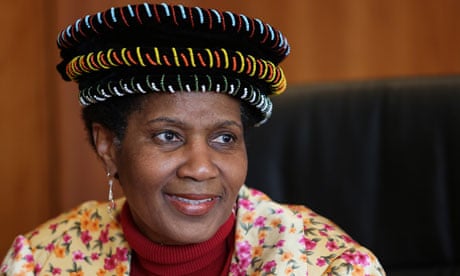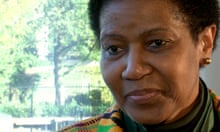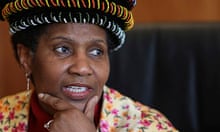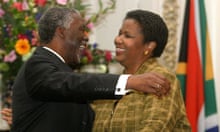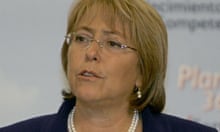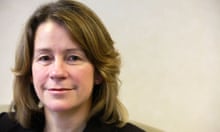Phumzile Mlambo-Ngcuka has just witnessed blatant sexism on her doorstep. The Zimbabwe president, Robert Mugabe, castigated Lindiwe Zulu, a top South African diplomat, as an "idiotic street woman" and urged his South African counterpart, Jacob Zuma, "to stop this woman of theirs from speaking on Zimbabwe". Far from challenging Mugabe's crude chauvinism, Zuma publicly distanced himself from Zulu and gagged her.
"I thought it was really unfortunate because she's there as a professional," Mlambo-Ngcuka says. "Her gender is neither here nor there." And South Africa's response? "I think they should have nuanced it differently," she replies, diplomatically.
Formerly the deputy president of South Africa, Mlambo-Ngcuka takes the helm next month at UN Women, a three-year-old agency still striving for enough funds, recognition and a chance to make its mark.
The 57-year-old replaces Michelle Bachelet, who resigned in March to run for another term as president of Chile, at a time when some perceive a global backlash against women's rights.
"I don't know if it's a clear backlash," Mlambo-Ngcuka says, during an interview at the Umlambo Foundation, which she set up in 2008 to support schools in poor areas of South Africa. "I think we're competing with many other issues. Maybe there's a little bit of fatigue.
"At the same time, women's issues have become more complex. If you look at new violations against women, like cybercrime-related gender-based violations, if you look at human trafficking, that is very well organised and well-funded, and it's a push-of-a-button money exchange. There's a sense in which we have to become smarter about how we fight these women's issues and recruit new people. For instance, the law enforcers in many of our countries might not have moved as fast to identify these new crimes and deal with them as effectively as possible. So there's a lot to learn, also for us as the women's movements."
But Mlambo-Ngcuka is also likely to face older barriers of tradition, religion and culture, including from those who are quick to denounce feminism as a western ideology that is being imposed from outside. She believes the days of such excuses from the powerful are numbered. "I don't think there are many governments who have a leg to stand on as far as that is concerned, which doesn't mean it doesn't happen, but they don't have the courage to stand up and say that," she says. "The fact that, in many countries, sexism can be criminalised means that it is very difficult to be a leader and public representative and be blatantly sexist."
In countries such as Afghanistan, the Democratic Republic of the Congo, India, Pakistan, Somalia and South Africa itself, however, there remains a yawning chasm between legal theory and the daily reality of women's lives on the ground. The new UN Women executive director says: "Rape has become, for instance, one of the weapons in war situations that is used specifically against women, with impunity. That tells you there are deep-rooted traditional attitudes towards women.
"If we also look at the problem that is still with us, of child brides, which happens in full view of communities, you've got parents of one family actually giving up a child to another family to take as a wife way before that child is ready to be an adult. Those campaigns against child brides still remain a very important part of the struggle for women's rights. We do need to make the fight visible and we do need to look at how we support governments and NGOs, which are a crucial part of taking these battles forward. You need to support them to have their voice heard, and louder.
"You also need to engage with traditional institutions. In many countries there are organised traditional authority institutions; one needs to engage with them head on because not all members of those institutions are backwards in their thinking. There's still some people you could actually win over and they become the inside voice in those institutions to advocate for a more gender-responsible approach."
Mlambo-Ngcuka arrives at the UN as the millennium development goals (MDGs) near their culmination and debate begins in earnest on development agenda after 2015 when the MDGs expire. UN Women says the MDGs have spurred significant progress, but yielded uneven results, including lack of progress on reducing maternal mortality. About 800 women die every day due to childbirth and other pregnancy-related complications. The agency has proposed a stand-alone gender equality goal in any future development targets, which would include indicators to monitor performance.
"I don't think post-2015 we can have an emphasis around women that is less strong than what we had in the MDGs as we have them now," Mlambo-Ngcuka says. "We have not arrived at where we want to go. The MDGs continue to be concerned about poverty more than anything else. If you do not put women at the centre of this fight against poverty, we just won't achieve what we want to achieve."
The former teacher, who led a gender-equality organisation during the racial apartheid era, also wants a strong emphasis on education. "Education for me is a cross-cutting priority. It is the equaliser, not only for girl-children but for all the women who need second chances."
As deputy to president Thabo Mbeki, Mlambo-Ngcuka was the most senior female politician in South African history. When Mbeki was ousted by his own party, the African National Congress, it spelled an abrupt departure for Mlambo-Ngcuka too. She does not believe her gender was a factor. Last year, another South African woman, Nkosazana Dlamini-Zuma, was elected chair of the African Union, but still only two of the continent's 55 countries have female presidents: Ellen Johnson Sirleaf of Liberia and Joyce Banda of Malawi.
"Still a long way to go," Mlambo-Ngcuka says with a sigh. "It is a lonely club. Thank God they are such strong women themselves – it will take a lot of strong men to really put them down. But I also know that the issues closest to their hearts have not been able to top the agenda."
New kid on the block
UN Women is the new kid on the block, with everything still to prove. Mlambo-Ngcuka contends that the agency should not be judged too harshly. "There hasn't been enough time for all the things it has started to be proved decisively … you can never look at funding as the only thing on which you could implement and build your programmes.
"Collaboration is essential because within the UN you've got different institutions who have a critical mandate that impacts on women. UN Women must not try and be the health experts but we must be able to work with the WHO [World Health Organisation] in such a manner that we even enhance the impact that they have on women. The same with [UN Children's Fund] Unicef."
Mlambo-Ngcuka believes the struggle for gender equality is still a work in progress, and what women share in common is more important than their differences. "Let's face it, when a rapist stands in front of you and there's two women – one is rich, one is poor, one is educated, one is not – you are in danger in the same way and it just takes away whatever divides for you. That is why for me it is very important for women … in different political parties, different institutions [to] fight these ills together."
Some gender activists blame a lack of leadership for South Africa's attitudes towards women, noting that Zuma is a polygamist with four wives, has stood trial for rape after having unprotected sex with an HIV-positive woman (he was acquitted) and once remarked that it is "not right" for women to be single.
Mlambo-Ngcuka goes into diplomatic mode again for this topic. "I leave the people to judge," she says, laughing. "Let me reflect on it. I'll get back to you on that one."
